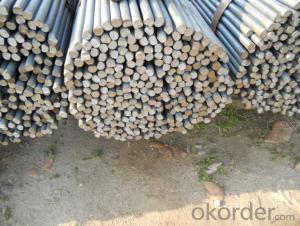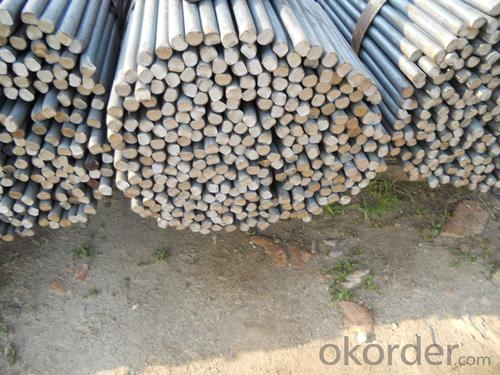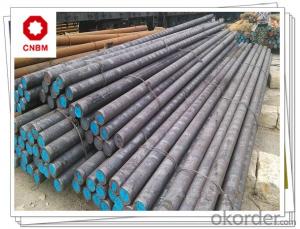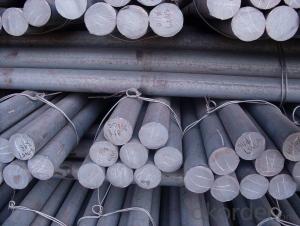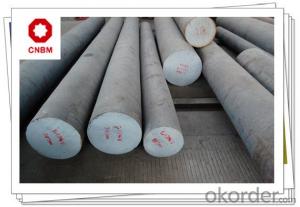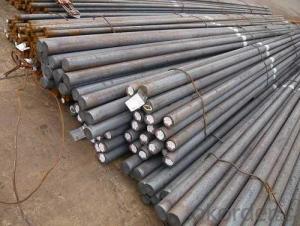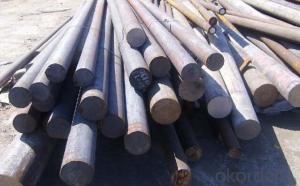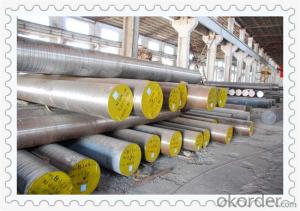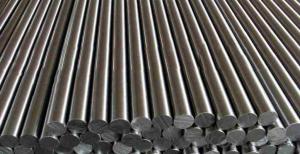Hot Rolld Steel Round Bars with Variety Grade
- Loading Port:
- Tianjin
- Payment Terms:
- TT or LC
- Min Order Qty:
- 200 m.t.
- Supply Capability:
- 30000 m.t./month
OKorder Service Pledge
OKorder Financial Service
You Might Also Like
OKorder is offeringHot Rolld Steel Round Bars with Variety Grade at great prices with worldwide shipping. Our supplier is a world-class manufacturer of steel, with our products utilized the world over. OKorder annually supplies products to African, South American and Asian markets. We provide quotations within 24 hours of receiving an inquiry and guarantee competitive prices.
Product Applications:
Hot Rolld Steel Round Bars with Variety Grade are ideal for structural applications and are widely used in the construction of buildings and bridges, and the manufacturing, petrochemical, and transportation industries.
Product Advantages:
OKorder's Hot Rolld Steel Round Bars with Variety Grade are durable, strong, and wide variety of sizes.
Main Product Features:
· Premium quality
· Prompt delivery & seaworthy packing (30 days after receiving deposit)
· Can be recycled and reused
· Mill test certification
· Professional Service
· Competitive pricing
Product Specifications:
Manufacture: Hot rolled
Grade: Q195 – 235
Size: 8MM~50MM
Certificates: ISO, SGS, BV, CIQ
Length: 6m – 12m, as per customer request
Packaging: Export packing, nude packing, bundled
FAQ:
Q1: How do we guarantee the quality of our products?
A1: We have established an advanced quality management system which conducts strict quality tests at every step, from raw materials to the final product. At the same time, we provide extensive follow-up service assurances as required.
Q2: How soon can we receive the product after purchase?
A2: Within three days of placing an order, we will arrange production. The normal sizes with the normal grade can be produced within one month. The specific shipping date is dependent upon international and government factors, the delivery to international main port about 45-60days.
Q3: what is the difference between actual weight and theoretical weight?
A3: All the section steel has two weights: actual weight and theoretical weight. Actual weight is the weighing out when the product delivered from the mill. Theoretical weight is calculated by pieces. The invoice can be based on each of them as your request.
Images:
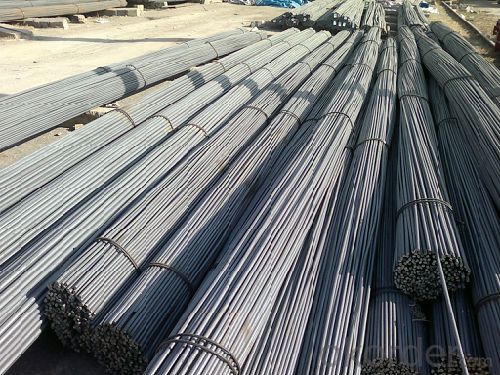
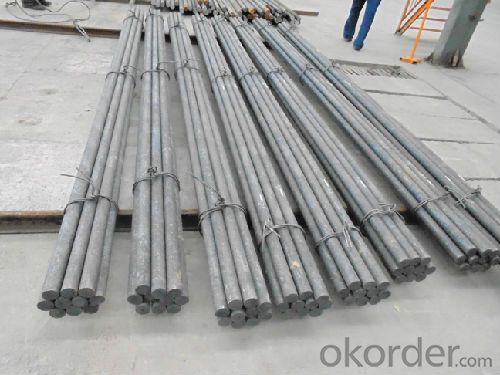
- Q: How do you measure the hardness of a steel round bar?
- The hardness of a steel round bar can be measured using various methods, with the most common method being the Rockwell hardness test. This test involves applying a specific load to an indenter and measuring the depth of the indentation left on the material's surface. To measure the hardness of a steel round bar using the Rockwell hardness test, the following steps can be followed: 1. Select the appropriate Rockwell scale for the steel being tested. The most commonly used scales for steel are HRC (Rockwell C) and HRB (Rockwell B). 2. Clean the surface of the steel round bar to remove any dirt, oil, or contaminants that could affect the accuracy of the test. 3. Place the steel round bar on a flat and stable surface, ensuring it is properly supported to prevent any movement during testing. 4. Select the appropriate indenter for the chosen Rockwell scale. For HRC, a diamond cone indenter is typically used, while for HRB, a hardened steel ball is used. 5. Apply a preliminary minor load to the indenter, typically 10 kgf (kilogram-force) for HRC and 3 kgf for HRB. This helps ensure proper contact between the indenter and the material's surface. 6. Apply the major load, which is specific to the chosen Rockwell scale. For HRC, it is typically 150 kgf, while for HRB, it is usually 100 kgf. 7. Allow the major load to dwell for a specific period, typically 15 seconds, to ensure proper indentation. 8. Release the major load while keeping the minor load applied. This allows the indenter to partially recover, reducing the depth of the indentation. 9. Measure the depth of the remaining indentation using a microscope or a specialized Rockwell hardness testing machine. The measured value corresponds to the hardness value on the chosen Rockwell scale. It is important to note that the Rockwell hardness test is just one of several methods available to measure the hardness of a steel round bar. Other methods, such as the Brinell hardness test or the Vickers hardness test, may also be used depending on the specific requirements of the application.
- Q: What are the advantages of using nickel-molybdenum-chromium alloy steel round bars?
- Nickel-molybdenum-chromium alloy steel round bars offer several advantages. Firstly, they exhibit excellent corrosion resistance due to the addition of nickel and chromium. This enhances their ability to withstand oxidation and various corrosive environments, making them ideal for applications where exposure to moisture or chemicals is a concern. Secondly, the inclusion of molybdenum in the alloy strengthens and toughens it. This makes the nickel-molybdenum-chromium alloy steel round bars suitable for high-stress applications, such as in the construction of heavy machinery or structures that require durability and resistance to wear and tear. In addition, this alloy steel demonstrates exceptional heat resistance. It can endure high temperatures without compromising its structural integrity, making it suitable for applications involving extreme heat, such as in the aerospace or power generation industries. Furthermore, nickel-molybdenum-chromium alloy steel round bars possess good weldability, allowing for ease of fabrication and versatility in various manufacturing processes. This makes them a preferred choice for engineers and manufacturers who require a material that can be easily formed or joined to create complex shapes or structures. Lastly, the nickel content in this alloy steel provides excellent resistance to cracking and brittleness, ensuring long-lasting reliability. This guarantees that the round bars will maintain their strength and structural integrity over an extended period, minimizing the risk of failure or breakage in critical applications. Overall, nickel-molybdenum-chromium alloy steel round bars offer enhanced corrosion resistance, improved strength and toughness, excellent heat resistance, good weldability, and high reliability. These qualities make them a preferred choice for a wide range of applications in industries such as construction, manufacturing, and aerospace.
- Q: How do you prevent corrosion on steel round bars?
- To prevent corrosion on steel round bars, there are several effective methods that can be employed: 1. Coating: Applying a protective coating on the steel round bars is a common way to prevent corrosion. Coatings like paint or epoxy can act as a barrier between the steel and the external environment, preventing moisture and corrosive substances from coming into contact with the metal. 2. Galvanization: Galvanizing the steel round bars involves applying a layer of zinc on the surface. This zinc layer acts as a sacrificial anode, corroding in place of the steel if any damage occurs. This method is particularly effective in preventing corrosion in outdoor or marine environments. 3. Stainless steel: Using stainless steel round bars that contain a high percentage of chromium and nickel is another effective corrosion prevention method. The presence of these elements forms a passive, protective film on the surface of the steel, which acts as a barrier against corrosion. 4. Proper storage: Storing steel round bars in a dry and well-ventilated area can help prevent corrosion. Moisture, especially in humid environments, can accelerate the corrosion process. Therefore, it is crucial to keep the round bars away from direct contact with water or any other corrosive substances. 5. Regular maintenance: Regularly inspecting the steel round bars for signs of corrosion and promptly addressing any issues can prevent further damage. This may involve cleaning the bars using appropriate methods and applying protective coatings as necessary. By implementing these preventive measures, corrosion on steel round bars can be significantly reduced, ensuring their longevity and maintaining their structural integrity.
- Q: What are the different types of steel round bar coatings used in the marine industry?
- There are several types of steel round bar coatings commonly used in the marine industry, including galvanized coatings, epoxy coatings, and corrosion-resistant coatings. These coatings help protect the steel from rust and corrosion caused by exposure to saltwater and other harsh marine environments.
- Q: How do I determine the strength and hardness of a steel round bar?
- In order to assess the strength and hardness of a steel round bar, various methods and tests can be employed: 1. Tensile Test: The strength of a steel bar is commonly determined through this method. It involves subjecting the bar to a tensile force until it fractures, and measuring the maximum force or load it can endure. This test provides information on the bar's ultimate tensile strength, yield strength, and elongation. 2. Hardness Test: Several techniques, such as the Rockwell, Brinell, and Vickers hardness tests, can be utilized to measure the hardness of a steel bar. These tests entail indenting the bar's surface using a standardized indenter and gauging the resulting indentation size. The obtained hardness value indicates the bar's resistance to deformation and wear. 3. Charpy Impact Test: This test gauges the toughness of a steel bar by striking it with a swinging pendulum and measuring the energy absorbed during fracture. It helps assess the bar's ability to withstand brittle fracture under conditions of impact loading. 4. Microstructural Analysis: Examining the microstructure of the steel bar through microscopic observation can offer insights into its mechanical properties. By preparing a polished and etched sample and inspecting it under a microscope, the presence of different phases, grain size, and any structural irregularities can be observed. Various microstructural features can impact the bar's strength and hardness. 5. Chemical Composition Analysis: The chemical composition of the steel bar, particularly the carbon content, significantly influences its strength and hardness. Analyzing the composition using techniques like spectroscopy or chemical analysis can provide valuable information about the bar's mechanical properties. It should be emphasized that these tests and techniques must be carried out by qualified professionals in a controlled laboratory setting to ensure accurate and reliable results. Moreover, specific standards and specifications may exist for different applications, so referring to relevant standards and guidelines can offer further guidance on determining the strength and hardness of a steel round bar.
- Q: Can steel round bars be used in the manufacturing of shafts?
- Yes, steel round bars can be used in the manufacturing of shafts. Steel round bars are often used as raw materials for shaft manufacturing due to their high strength, durability, and excellent mechanical properties. The round shape of the bar allows for easier machining and forming processes, making it suitable for creating shafts of various sizes and lengths. Additionally, steel round bars can be heat treated to enhance their hardness, strength, and wear resistance, further improving their suitability for shaft applications.
- Q: How can steel round bars be protected against corrosion?
- Steel round bars can be protected against corrosion through various methods. One common method is the application of a protective coating such as paint or epoxy. The coating acts as a barrier between the steel surface and the corrosive elements in the environment, preventing direct contact and thus reducing the risk of corrosion. Another effective way to protect steel round bars from corrosion is by galvanizing them. Galvanization involves coating the steel with a layer of zinc, which acts as a sacrificial anode. The zinc layer corrodes instead of the steel, providing a long-term protection against corrosion. Regular maintenance and inspection are also important in preventing corrosion. This includes removing any rust or scale that may have formed on the surface of the steel round bars, as these can accelerate the corrosion process. Additionally, keeping the steel round bars dry and free from moisture is essential, as excessive exposure to water or humidity can lead to corrosion. In industrial environments or areas where corrosive chemicals are present, it may be necessary to use specialized corrosion-resistant alloys for the steel round bars. These alloys, such as stainless steel or nickel alloys, have a higher resistance to corrosion and can withstand harsh conditions better than regular steel. Overall, the key to protecting steel round bars against corrosion is a combination of proper coatings, regular maintenance, and selecting the appropriate materials for the specific environment in which they will be used.
- Q: How are steel round bars used in the construction of stadiums and sports facilities?
- Steel round bars are commonly used in the construction of stadiums and sports facilities for their strength, durability, and versatility. These bars are often used as structural elements, providing support and stability to the overall structure. They can be used in the construction of columns, beams, and frames, ensuring the integrity and safety of the facility. Additionally, steel round bars are also used in the fabrication of seating structures, railings, and fencing, enhancing the aesthetic appeal and functionality of the sports venue.
- Q: Can steel round bars be hardened?
- Yes, steel round bars can be hardened. Hardening is a process in which the steel is heated to a specific temperature and then rapidly cooled, commonly known as quenching. This rapid cooling causes the steel to undergo a transformation, resulting in increased hardness and strength. The hardening process is typically followed by tempering, which involves reheating the hardened steel to a lower temperature to reduce its brittleness and further enhance its toughness. Hardening is commonly used in the manufacturing of tools, machine parts, and other applications where high strength and durability are required.
- Q: How about the difference between round steel and shaped steel? Where are they mainly used?
- Low carbon steel Q235 steel hot rolled into a round, mainly used in concrete. Medium and high carbon tool steels are wound into large diameter round bars and are used in the machinery industry for cutting into components.
Send your message to us
Hot Rolld Steel Round Bars with Variety Grade
- Loading Port:
- Tianjin
- Payment Terms:
- TT or LC
- Min Order Qty:
- 200 m.t.
- Supply Capability:
- 30000 m.t./month
OKorder Service Pledge
OKorder Financial Service
Similar products
Hot products
Hot Searches
Related keywords
